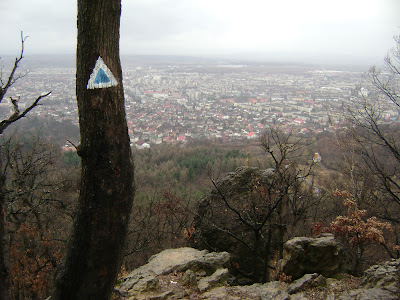(
This article ran in Kyiv Post in slightly different format; I posted this on my blog after I thought it had been "pocket vetoed" by their editors, only to learn it had been run after all!)
Gorchitza Live Project's 2008 debut album included several infectious pop house songs ("One True Message," "Time is Right"). Their funk-tastic "Final Cut" has been tearing up the Ukrainian pop chart in recent weeks, and the group is currently wrapping up work on their sophomore album. On 22 January they debuted some terrific material from the forthcoming album at the grand opening of club Crystal Hall.
After years of listening to Gorchitza from an ocean away, I found myself late for a Kiev cafe rendez-vous with the band. I stumbled up to the table where singer Allois and manager Andrey were waiting for me. I was wheezing and coughing from running the final blocks in the subero temperatures. Andrey suggested warm milk and honey to sooth my ragged throat, and when I had finally caught my breath we proceeded to discuss all things "mustard" (that's "Gorchitza" translated into English).
Gorchitza's principal composer got started as many musicians do--by noodling around. "When I was 19 I worked as a sound engineer at a little provincial radio station," Alexey explains. "The editor room was empty in evenings, so I liked to glue films in loops and to play a synthesizer."
Singer Allois was singing in a club when Andrey stumbled across her. "I was really shocked because I called immediately from that club to Alexey and said, 'We found her! We found her!' "
Judging by publicity photos posted to their MySpace and Facebook pages, Allois and Alexey are the core of Gorchitza. In the studio they also receive additional input from guitarist Oktav. In concert the live group often adds a drummer and bassist.
I asked Allois why she sings in English when most Ukrainian groups stick to Ukrainian or Russian?
"It's natural," Allois says. "I listen to music which is written by English-language singers, so English sounds much better and more suitable for writing songs."
After Allois pens her lyrics she sends them to a friend in London to proof-read, "because I might not know some rules; some specific things about English."
The influence of more westerly European and American music is strong. "I prefer British music," Alexey explains. "I am also fond of the French sound and American hip-hop." Hearing I was from Atlanta, Allois praised Atlanta singer Gaelle, whose solo album Transient has been on heavy rotation on her iPod.
But if you are a Ukrainian group that writes its name in Roman letters instead of Cyrrilic, sings English-language lyrics, and draws most of its influences from west of Ukraine's borders, doesn't this alienate you from Ukrainian fans?
"We can't be famous in this country because people don't understand what we are singing about," Allois says pessimistically.
"Our problem here [in Ukraine] is that we are not recognized as a Ukrainian band," manager Andrey says. "People always tell us, 'Are you singing the song? No, it's not you! It's a kind of famous European band, and you're just doing a cover!' "
But Andrey sees a positive side to focusing on international success. "When Ukrainians are abroad--students who go to London or students who go to Paris--and they talk about the country and the music from the country, they play CDs of us. For them we are a symbol of pride."
Romanian dance producers made the switch from Romanian-language lyrics to English ones over the course of the last ten years, which has yielded phenomenal international chart success for such artists as Inna and Morandi. Is Gorchitza attempting to blaze the same sort of path for Ukrainian dance artists?
"It's not so simple," Andrey says. He notes the tremendous amount of time it takes to coordinate various aspects of an international music career (lining up release dates in different countries to coincide with different festival dates). "It only works together. We cannot put 'Time is Right' into iTunes and then come to America two years after. It doesn't make sense."
As is also the case with the Ukrainian movie industry, the fall of the Soviet Union has seen the dismantling of much of the infrastructure for Ukrainian music distribution (which remained in Moscow). Now Ukraine is attempting to build a new music network within its own borders. It's a difficult process. Gorchitza has been very thankful for the fact that Russians are enthusiastic about their music, and have seen a fruitful partnership emerge with Russian music promoters in recent months.
We conducted the interview shortly after the first round of presidential elections, so I asked about their interest in the politics.
"We are not interested at all," Andrey says. "We are living in it, and it's a pretty awful situation. I never voted in my life. I am 32 and I never voted.
"It's not so interesting when you are living here. It's a kind of exploitation of minds. That is why politics is more popular here than music. It's a rival for us."
Alexey did not join us at the cafe (his responses in this article were emailed later). He has been consumed by work on the second album. "I’m almost absorbed by this process," he writes. "I guess our band has been born only now."
Gorchitza has talent and solid tunes. The only question is whether they will find international success before they are celebrated within their own country.







